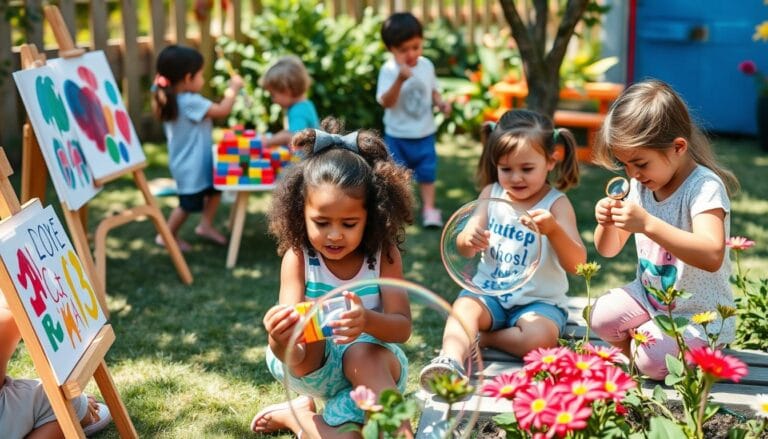
Gifted Children Challenges and Support Effective Strategies
Gifted Children Challenges and Support possess remarkable intellectual abilities that set them apart from their peers. However, their journey is not without challenges. These gifted children face unique hurdles in various aspects of their lives, including social, emotional, and academic domains. It is essential for parents and educators to understand these challenges and provide the necessary support to help them thrive.
Key Takeaways:
- Gifted Children Challenges and Support experience asynchronous development, where their advanced intellectual abilities clash with age-appropriate social and motor skills.
- Supporting gifted children’s social-emotional needs is crucial in creating a nurturing environment.
- Boredom in the classroom and perfectionism are common challenges faced by gifted children.
- Individualized support, advocacy, and understanding gifted children’s traits are key components in providing the support they need to thrive.
- By addressing these challenges, gifted children can reach their full potential and make meaningful contributions to society.
Challenges Faced by Gifted Children
Gifted children face a unique set of challenges that can impact their social, emotional, and academic well-being. Identifying and understanding these challenges is crucial for providing the support and resources they need to thrive.
Self-Esteem Issues
Gifted children often feel different from their peers, which can lead to self-esteem issues. They may struggle with fitting in and finding their place in social groups, making them more vulnerable to bullying or rejection. It is essential to create an inclusive environment that celebrates their strengths and fosters positive self-esteem.
Perfectionism
Many gifted children exhibit traits of perfectionism. They have a strong drive to achieve and may fear failure or making mistakes. This relentless pursuit of perfection can create added pressure and stress, impacting their mental well-being and hindering their ability to take risks and explore new opportunities.
Emotional and Sensory Sensitivity
Gifted children often possess heightened emotional and sensory sensitivity. They are more attuned to both their own emotions and the feelings of those around them. This sensitivity can make them more susceptible to stimuli and deeply affected by the emotions of others, leading to increased stress and anxiety.
Boredom at School
Many gifted children experience boredom in traditional classroom settings. The pace and depth of learning may not match their intellectual abilities, leading to disengagement and underachievement. Providing intellectually stimulating and challenging educational opportunities is essential to keep gifted children motivated and interested in their studies.
Attention and Organization Challenges
Gifted children may face attention and organization challenges that can impact their academic performance. They may struggle with maintaining focus, managing time, and staying organized. Implementing strategies and accommodations, such as differentiated instruction and organizational tools, can help them overcome these challenges and reach their full potential.
| Challenges | Effects |
|---|---|
| Self-Esteem Issues | Low self-esteem, vulnerability to bullying |
| Perfectionism | High pressure, fear of failure |
| Emotional and Sensory Sensitivity | Heightened stress, anxiety |
| Boredom at School | Disengagement, underachievement |
| Attention and Organization Challenges | Difficulty staying focused and organized |
Supporting Gifted Children’s Social-Emotional Needs
Supporting the social-emotional needs of gifted children is essential for their overall well-being and development. Gifted children often have unique traits and characteristics that require special attention and understanding from parents and educators. By providing the right support, we can help gifted children thrive and reach their full potential.
One way to support gifted children’s social-emotional needs is by encouraging pretend play and engaging them in activities that build their social and emotional skills. Pretend play allows them to develop empathy, perspective-taking, and problem-solving abilities. It also provides an opportunity for them to practice social interactions and develop meaningful relationships with their peers.
Enrolling gifted children in sports or extracurricular activities is another effective way to support their social-emotional needs. These activities not only promote physical fitness but also provide opportunities for building teamwork skills and developing confidence outside of their intellectual abilities. Through participation in team sports or group activities, gifted children can learn cooperation, compromise, and leadership skills, which are essential for healthy social-emotional development.
Advocating for gifted children’s needs within the school system is crucial. Gifted children may require accommodations or specialized programs to meet their unique learning abilities. By working closely with teachers, administrators, and school counselors, parents can ensure that their gifted children receive the appropriate educational resources and adaptations necessary for their academic and social-emotional growth.
Understanding the unique traits of gifted children is also key to providing effective support. Gifted children often exhibit intense curiosity, advanced problem-solving skills, and heightened emotional sensitivity. Being aware of these traits can help parents and educators tailor their interactions and interventions to meet the specific needs of gifted children. By fostering an environment that values their strengths and supports their challenges, we can create a positive and nurturing space for gifted children to thrive.
In conclusion, supporting gifted children’s social-emotional needs requires a multi-faceted approach that involves encouraging pretend play, engaging in extracurricular activities, advocating within the school system, and understanding their unique traits. By providing the necessary support, we can help gifted children develop healthy social-emotional skills and ensure their overall well-being.
Addressing Academic Challenges in Gifted Children
Gifted children have unique educational needs that require special attention and support from parents and educators. While their intellectual abilities may be advanced, they often face academic challenges that can hinder their growth and development. It is crucial to address these challenges effectively in order to ensure that gifted children can reach their full potential and excel in their academic pursuits.
One common challenge faced by gifted children is a sense of boredom in the classroom. Due to their advanced knowledge and understanding, they may find traditional teaching methods repetitive and unstimulating. To combat this, it is essential to provide gifted children with accelerated learning opportunities or specialized programs that cater to their intellectual needs. These programs can offer more challenging and engaging material, allowing gifted children to delve deeper into their areas of interest and expand their knowledge.
Another way to support gifted children academically is by implementing classroom accommodations that cater to their unique learning styles. For example, allowing them to doodle during lectures or providing mentorship opportunities can help stimulate their creativity and enhance their learning experience. Creating a nurturing and supportive environment that acknowledges and celebrates their strengths can also contribute to their academic success.
It is important for parents and educators to recognize that being gifted does not automatically translate to straight A’s in every subject. Gifted children may excel in certain areas while facing challenges in others. It is crucial to help them form realistic expectations and develop resilience in the face of academic setbacks. By emphasizing growth mindset and the value of effort and perseverance, gifted children can learn to embrace challenges as opportunities for learning and growth.
Academic Challenges Faced by Gifted Children
| Academic Challenges | Support Strategies |
|---|---|
| Boredom in the classroom | Provide accelerated learning opportunities and specialized programs |
| Difficulty in certain subjects | Offer additional support and resources in challenging areas |
| Underachievement | Set realistic expectations, encourage resilience, and provide targeted guidance |
| Perfectionism and fear of failure | Promote a growth mindset and emphasize the value of effort and progress |
By addressing the academic challenges faced by gifted children and providing them with the necessary support and resources, we can create an educational environment that nurtures their talents and enables them to thrive. Supporting gifted children at school not only benefits the individuals themselves, but also contributes to the advancement of society as a whole.
The Impact of Perfectionism on Gifted Children
Perfectionism is a common challenge faced by gifted children. Due to their exceptional abilities, these children often feel immense pressure to excel in all areas of their lives, including academics. This relentless pursuit of perfection can lead to high levels of stress and anxiety, hindering their overall well-being and academic performance.
It is important for parents and educators to understand the unique traits and needs of gifted children in order to support them effectively. Instead of solely focusing on academic achievements, it is crucial to help these children develop a healthy self-concept that extends beyond their intellectual abilities.
By fostering a supportive environment that values progress over perfection, we can help gifted children overcome the challenges associated with perfectionism and develop a healthier relationship with achievement.
Emphasizing Effort and Growth Mindset
Parents and educators can play an instrumental role in helping gifted children overcome perfectionistic tendencies. By emphasizing the value of effort, perseverance, and growth mindset, we can shift their focus from solely chasing perfect outcomes to valuing the journey of learning and personal growth.
- Encourage effort and progress, rather than focusing solely on outcomes.
- Highlight the importance of learning from failure and using setbacks as opportunities for growth.
- Promote self-compassion and teach them to be kind to themselves, even when they make mistakes.
Cultivating a Supportive Environment
A supportive environment is crucial for helping gifted children navigate the challenges of perfectionism. By creating an atmosphere that values progress and individual growth, we can help alleviate the pressure they feel to achieve perfection.
- Encourage open communication and create a safe space for them to express their fears and concerns.
- Recognize and celebrate their strengths and achievements, both inside and outside the academic realm.
- Set realistic expectations and emphasize the importance of well-rounded development, including social and emotional growth.
The Benefits of Overcoming Perfectionism
By supporting gifted children in overcoming perfectionism, we can unlock their true potential and promote their overall well-being.
| Benefits of Overcoming Perfectionism | Effects on Gifted Children |
|---|---|
| Reduced stress and anxiety | Improved mental health and emotional well-being |
| Increased self-confidence | Greater willingness to take risks and explore new opportunities |
| Enhanced creativity and innovation | Freedom to think outside the box and challenge conventional ideas |
| Improved resilience and adaptability | Ability to bounce back from setbacks and embrace change |
By prioritizing the development of a healthy mindset and supporting gifted children in their quest for growth, we can foster their well-being and empower them to make meaningful contributions to the world.
Providing Individualized Support for Gifted Children
Supporting gifted children at school and at home requires a tailored approach that addresses their unique needs. By providing individualized support, parents and educators can ensure that these exceptional children thrive both academically and emotionally.
One essential aspect of individualized support is creating personalized learning plans. These plans take into account the specific strengths and interests of gifted children, allowing them to delve deeper into their areas of passion while still covering essential curriculum. Additionally, acceleration options can be offered to gifted children, enabling them to work at a pace that challenges and stimulates their intellectual abilities.
Emotional well-being is equally important for gifted children. Regular one-on-one check-ins with a trusted adult can provide the necessary support and guidance, allowing gifted children to discuss their thoughts, feelings, and challenges. Self-awareness and management activities can also help gifted children navigate their heightened emotional sensitivity, teaching them coping strategies that will benefit them throughout their lives.
Access to resources and professionals specializing in gifted education is crucial for providing comprehensive support. Gifted children can greatly benefit from the expertise and guidance of these professionals, who understand their unique educational and emotional needs. Whether it’s through counseling, mentorship, or specialized programs, these resources can make a significant difference in a gifted child’s development and well-being.
Example Individualized Support Plan for a Gifted Child
| Area of Support | Strategies |
|---|---|
| Academic |
|
| Social-Emotional |
|
| Resource and Professional Support |
|
By implementing individualized support strategies, parents and educators can create a supportive and nurturing environment that caters to the unique needs of gifted children. This approach acknowledges and celebrates their exceptional abilities while also addressing their social and emotional development. With the right support and resources, gifted children can thrive academically and emotionally, fulfilling their potential and making a positive impact on the world around them.
The Role of Advocacy in Supporting Gifted Children
Advocacy plays a crucial role in supporting the needs of gifted children. Parents, educators, and schools need to be proactive in understanding and meeting the unique needs of gifted children. By advocating for gifted children, their social, emotional, and academic well-being can be effectively addressed.
Understanding the traits and characteristics of gifted children is essential in providing the right support. Gifted children possess exceptional intellectual abilities and exhibit advanced cognitive skills beyond their chronological age. Their intense curiosity, rapid learning, and divergent thinking set them apart from their peers.
Advocating for gifted children involves various actions to ensure their needs are met. Firstly, parents and educators can actively engage with schools to advocate for appropriate educational accommodations and programs. This includes identifying challenging and enriched learning opportunities that stimulate their intellectual growth.
In addition to educational advocacy, raising awareness within the community about the needs and characteristics of gifted children is crucial. By doing so, parents and educators can foster understanding, encourage acceptance, and reduce misconceptions surrounding giftedness.
Access to resources and support is also vital in supporting the development of gifted children. By advocating for the availability of specialized programs, support groups, and professionals who specialize in gifted education, parents and educators can ensure that gifted children have the necessary resources to reach their fullest potential.
Advocacy for gifted children is a collective effort that requires collaboration among parents, educators, and schools. By working together, we can create a nurturing environment that acknowledges and responds to the unique needs of gifted children. Through advocacy, we can empower gifted children to thrive academically, socially, and emotionally, allowing them to make meaningful contributions to society.
Conclusion
Parenting and supporting gifted children comes with its own set of challenges and responsibilities. It is important for parents and educators to understand the unique traits and needs of gifted children and provide the necessary support and resources to help them thrive.
By recognizing and addressing the challenges faced by gifted children, we can create an environment that nurtures their intellectual, social, and emotional growth. Gifted children often experience asynchronous development, where their advanced intellectual abilities are juxtaposed with age-appropriate social and motor skills. This can lead to frustrations and self-doubt. Additionally, their heightened sensitivity and emotional intensity can impact their social and emotional well-being.
With the right support, Gifted Children Challenges and Support, gifted children can reach their full potential and make meaningful contributions to society. By providing individualized support, advocating for their needs, addressing their academic challenges, and supporting their social-emotional well-being, we can help them flourish. When parents, educators, and schools work together to create a nurturing and supportive environment, gifted children have the opportunity to thrive and make a positive impact on the world.
FAQ
What challenges do gifted children face?
Gifted Children Challenges and Support, Gifted children face challenges such as asynchronous development, heightened sensitivity, emotional intensity, perfectionism, boredom at school, and difficulties with attention and organization.
How can we support gifted children’s social-emotional needs?
Parents and educators can support gifted children’s social-emotional needs by encouraging pretend play, engaging them in activities that build social and emotional skills, enrolling them in sports or extracurricular activities, and advocating for their needs within the school system.
What are some academic challenges faced by gifted children?
Gifted children may face academic challenges such as boredom in the classroom, underachievement, and a need for specialized programs and accommodations.
How does perfectionism impact gifted children?
Perfectionism can impact gifted children’s well-being by creating high levels of stress and anxiety. It is important to help them develop a healthy self-concept and emphasize the value of effort, perseverance, and growth mindset.
How can we provide individualized support for gifted children?
Individualized support for gifted children can involve creating personalized learning plans, providing acceleration options, offering social-emotional support, and regular check-ins with a trusted adult. Access to resources and professionals who specialize in gifted education is also important.
What is the role of advocacy in supporting gifted children?
Advocacy plays a crucial role in supporting the needs of gifted children. Parents, educators, and schools need to work together to advocate for appropriate educational accommodations and programs, raise awareness about giftedness, and ensure access to resources and support.













